Einführung
Sales is evolving rapidly, driven by a growing demand for smarter, faster, and more personalized engagement. Artificial Intelligence (AI) is at the center of this shift—powering everything from lead prioritization to predictive forecasting and customer insights. With AI, sales teams can focus on what matters most: building meaningful relationships and closing high-quality deals. This guide explores the top AI use cases redefining how sales organizations operate and compete.
What is AI and Why Does It Matter in Sales?
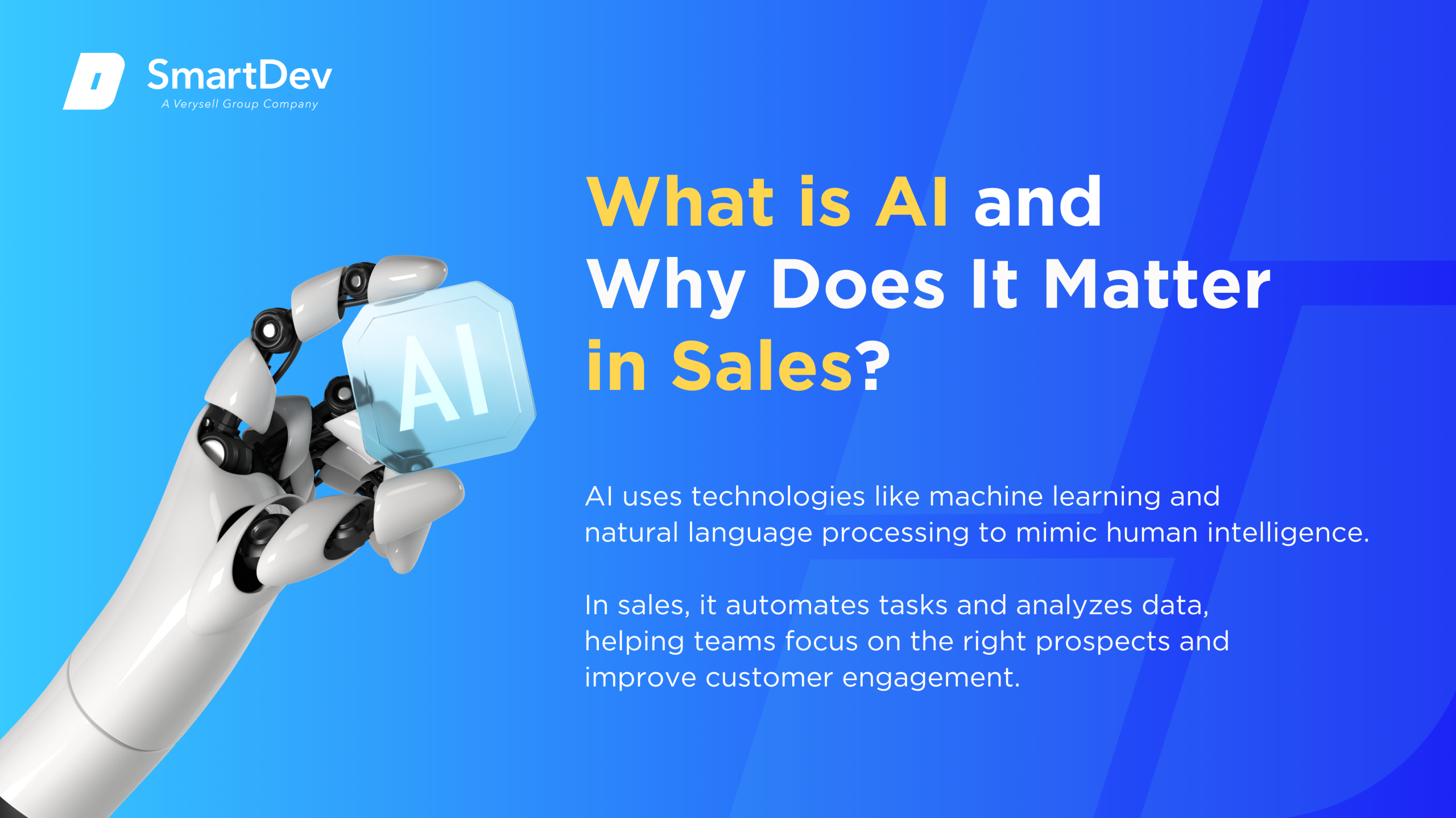
Definition of AI and Its Core Technologies
Artificial Intelligence (AI) refers to systems designed to mimic human intelligence by performing tasks such as pattern recognition, decision-making, and learning from data. It relies on core technologies like machine learning (ML), which identifies trends and makes predictions; natural language processing (NLP), which understands and generates human language; and computer vision, which interprets visual inputs like images or video.
In the context of sales, AI leverages these technologies to automate routine tasks, analyze vast datasets for insights, and enhance customer interactions, thereby improving sales efficiency and effectiveness. This means sales teams can spend less time on administrative work and more time engaging with the right prospects, armed with data-driven recommendations that improve outcomes and personalization at every touchpoint.
The Growing Role of AI in Transforming Sales
As AI capabilities mature, its role in sales is evolving rapidly, from automating routine tasks to enabling smarter, more agile decision-making. Sales organizations are increasingly integrating AI into their core processes to gain a competitive edge and meet the demands of today’s digitally driven buyers.
AI is revolutionizing sales by automating time-consuming tasks like data entry, lead routing, and qualification. This frees up sales professionals to focus on high-value activities such as building relationships and closing deals. Predictive analytics further enhances this by forecasting customer behavior and identifying the most promising leads.
Additionally, AI-driven tools deliver hyper-personalized customer experiences by analyzing data from past interactions, purchase history, and engagement patterns. These insights allow sales teams to tailor messaging and offers with precision, significantly improving conversion rates and customer satisfaction.
Key Statistics and Trends Highlighting AI Adoption in Sales
Adoption of AI in sales is accelerating, driven by the clear operational and financial benefits it delivers. According to a recent McKinsey survey, 78% of organizations now use AI in at least one function, with sales and marketing leading the charge, underscoring how essential AI is becoming in customer-facing roles.
Salesforce reports that 81% of sales teams are already experimenting with or have fully implemented AI tools, highlighting the mainstream shift toward AI-driven selling. These investments are paying off: companies leveraging AI in sales report revenue increases of up to 15% and ROI improvements between 10–20%.
This data confirms that AI isn’t just a future trend—it’s a current differentiator for high-performing sales teams.
Business Benefits of AI in Sales
AI is delivering real, measurable value in sales by addressing long-standing pain points such as inefficiency, lack of personalization, and inconsistent performance. The following five benefits highlight how AI is helping sales teams work smarter, close deals faster, and achieve stronger outcomes.
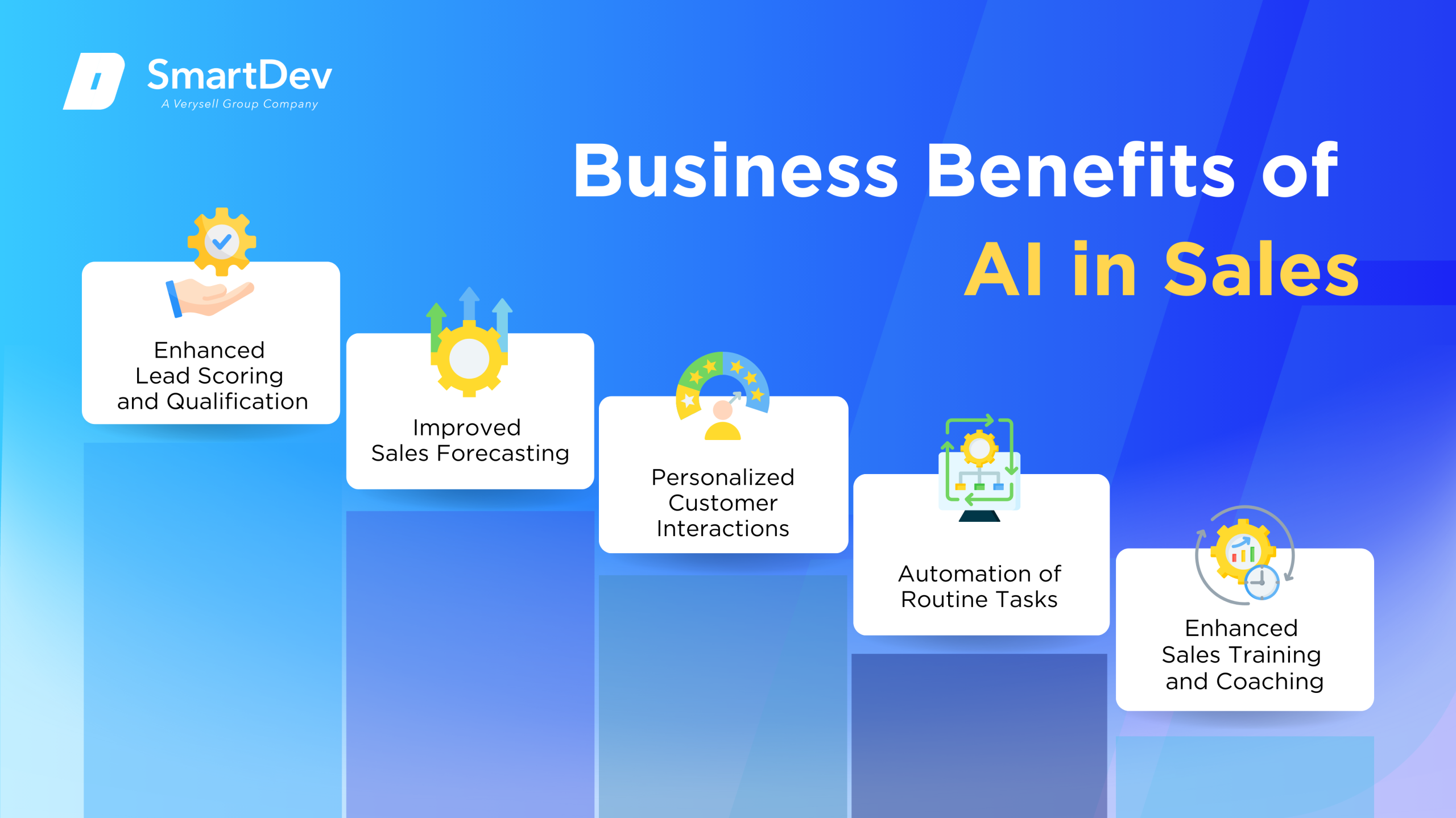
1. Enhanced Lead Scoring and Qualification
AI-driven lead scoring utilizes machine learning to analyze behavioral and demographic data, accurately predicting which leads are most likely to convert. This enables sales teams to prioritize high-quality prospects, improving conversion rates and reducing time spent on unqualified leads.
By continuously learning from new data, AI models adapt to changing customer behaviors, ensuring lead scoring remains effective over time. This dynamic approach allows for more efficient resource allocation and a streamlined sales process.
2. Improved Sales Forecasting
Advanced forecasting tools now harness historical sales data, real-time buyer activity, and market conditions to predict future outcomes more precisely. As a result, teams can plan inventory, staffing, and revenue targets with greater confidence.
When market conditions change, these models update forecasts in real time, minimizing costly miscalculations. This agility allows businesses to stay competitive and responsive to shifting demand.
3. Personalized Customer Interactions
AI enables sales teams to craft personalized messages and offers by analyzing buyer behavior, preferences, and past engagement history. This level of customization significantly boosts engagement, customer satisfaction, and overall conversion performance.
By mapping individual buying patterns, AI supports more precise targeting and content delivery, deepening customer relationships and brand loyalty. These personalized interactions ultimately drive higher long-term value per customer.
For more on how AI-powered virtual assistants enhance personalization, explore our guide on tailored customer experiences through AI.
4. Automation of Routine Tasks
Repetitive administrative work, such as updating CRM systems, scheduling meetings, and sending follow-up emails, can now be handled seamlessly by automation tools. This frees up reps to focus on building relationships and closing deals.
Consistent, error-free execution of these tasks improves efficiency and accelerates the sales cycle. The result is a smoother process and more productive teams.
Learn how AI automation enhances workflows and drives efficiency in our insightful breakdown of operational AI.
5. Enhanced Sales Training and Coaching
Training has become smarter, with AI-powered tools analyzing sales interactions to deliver real-time coaching and actionable feedback. This data-backed insight helps identify performance gaps and align coaching with individual needs.
As training is tailored to each rep’s performance, teams improve faster and stay aligned with buyer expectations. This continuous development ensures readiness in an increasingly dynamic sales environment.
Challenges Facing AI Adoption in Sales
While the benefits of AI in sales are compelling, implementing these technologies isn’t without its hurdles. From data quality issues to organizational resistance, several challenges can slow down or complicate adoption if not proactively addressed.
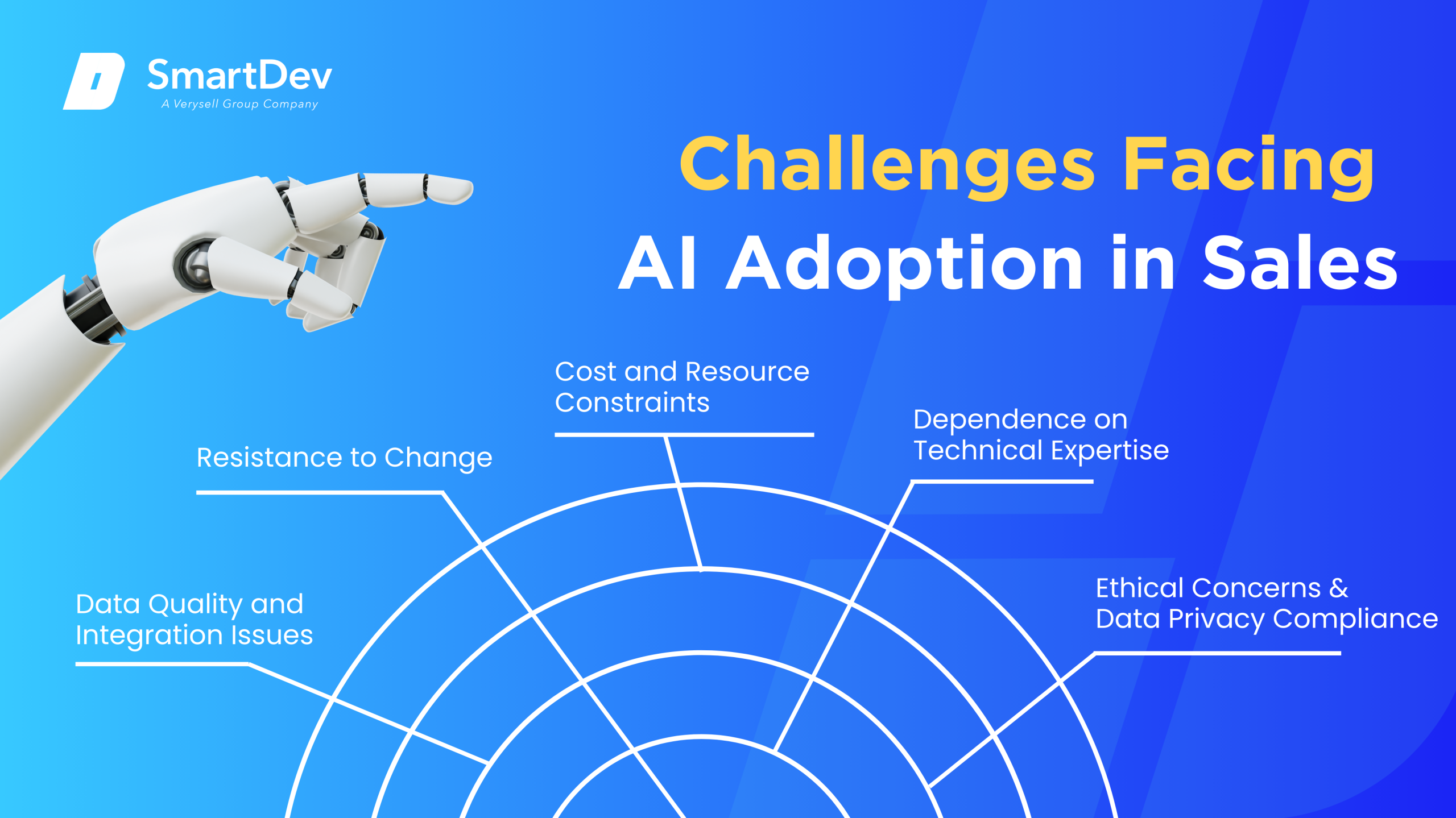
1. Data Quality and Integration Issues
Sales data is often spread across multiple platforms and systems, creating inconsistencies and gaps that disrupt AI performance. Without clean, structured, and unified data, AI models struggle to generate accurate forecasts or actionable insights.
Poor data quality undermines the reliability of AI outputs, causing misaligned targeting, ineffective personalization, and flawed decision-making. These issues are particularly acute in fast-paced sales environments where precision is critical.
2. Resistance to Change
AI adoption frequently encounters resistance from sales professionals who are skeptical of new technologies or uncertain about their impact. Concerns about job relevance, learning curves, or loss of control can create hesitation and disengagement.
This resistance can stall implementation timelines and reduce the overall effectiveness of AI tools. When adoption is slow or uneven across teams, it limits the scalability and consistency of AI-driven strategies.
3. Cost and Resource Constraints
Implementing AI in sales requires a significant upfront investment, not only in software but also in infrastructure, data integration, and support systems. These financial demands can be prohibitive for organizations with limited technology budgets.
Additionally, the full cost of AI adoption often includes hidden expenses such as operational disruption and time spent on onboarding. For many companies, these resource strains slow progress and limit the scope of AI initiatives.
4. Dependence on Technical Expertise
AI tools require specialized skills in areas like machine learning, data management, and system integration which are capabilities not typically found within sales teams. This technical dependency makes it difficult for organizations to independently deploy or maintain AI systems.
The lack of in-house expertise often leads to delays in implementation or suboptimal use of AI technologies. Over time, this dependency can create bottlenecks that prevent teams from adapting AI solutions to evolving business needs.
5. Ethical Concerns and Data Privacy Compliance
Using AI in sales involves handling large volumes of customer data, raising concerns around consent, transparency, and regulatory compliance. Misuse or mismanagement of data can expose companies to legal risk and reputational damage.
Growing scrutiny over how AI models process personal information has intensified these concerns. Inconsistent governance or unclear data practices can erode customer trust and hinder broader adoption of AI tools.
Specific Applications of AI in Sales
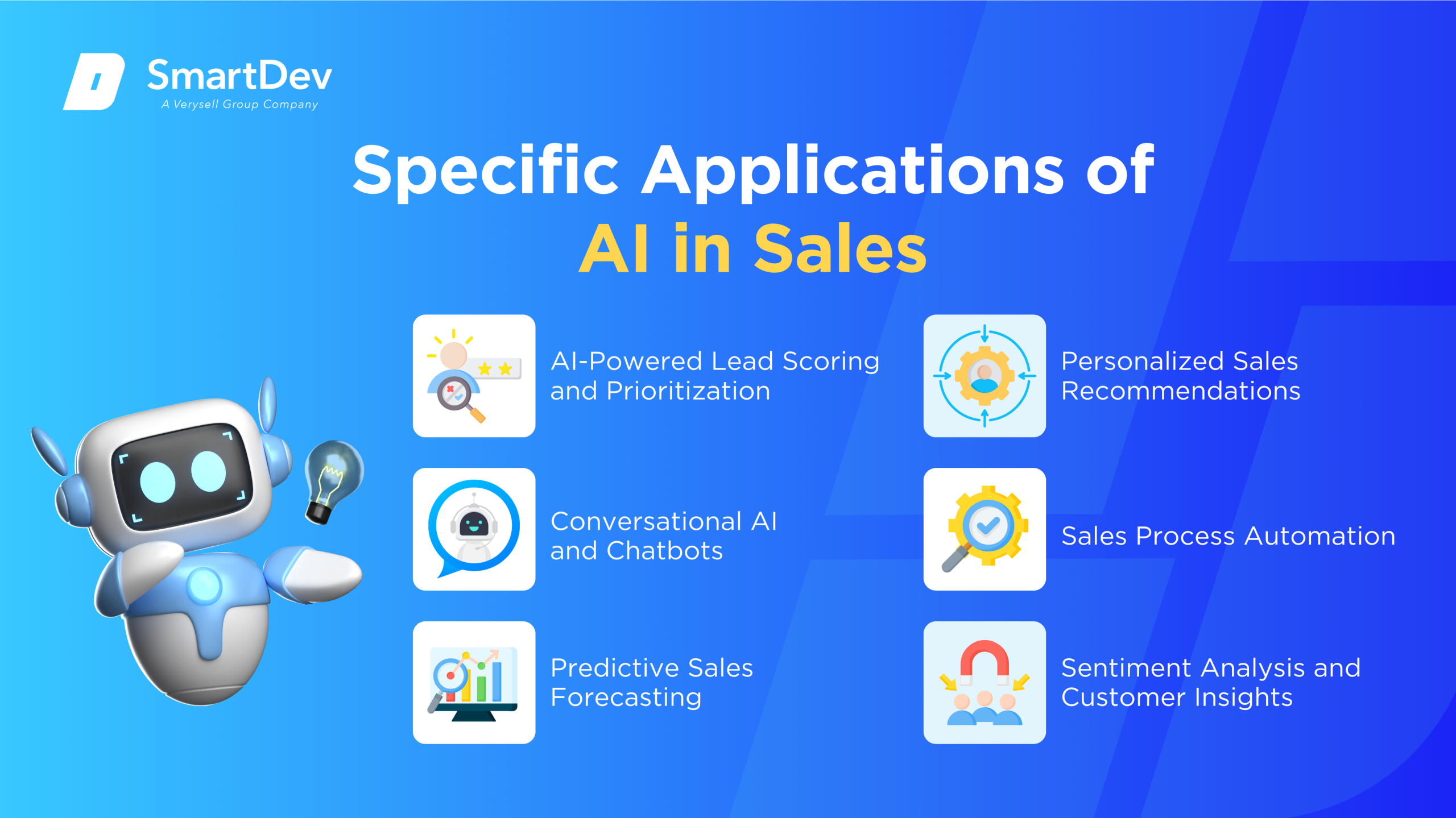
1. AI-Powered Lead Scoring and Prioritization
AI-powered lead scoring transforms sales prospecting by assigning scores to leads based on their likelihood to convert. It uses machine learning algorithms trained on past sales data to evaluate variables such as browsing behavior, content engagement, and firmographic details. This automation ensures sales teams focus their time and effort on leads that show strong buying intent.
The underlying models adapt over time, incorporating new data to improve accuracy and relevance. These systems often integrate directly with CRMs like Salesforce or HubSpot, allowing for real-time prioritization and automated workflows. This synergy significantly boosts efficiency while minimizing human bias in lead qualification.
Strategically, AI lead scoring boosts conversion rates, enhances team productivity, and supports more personalized outreach. Sales reps can tailor messaging based on lead scoring attributes, increasing engagement rates. Overall, this application drives more predictable and scalable sales pipelines.
Beispiel aus der Praxis:
Salesforce’s Einstein AI offers embedded predictive lead scoring within its CRM. By using AI to prioritize high-potential leads, users report a 30% lift in conversion rates and faster sales cycles.
2. Conversational AI and Chatbots
Conversational AI tools, such as chatbots and virtual agents, are reshaping customer engagement by enabling instant, intelligent communication. These systems answer questions, qualify leads, schedule demos, and even guide users through product catalogs in real time. By ensuring 24/7 availability, they dramatically reduce customer wait times.
Natural Language Processing (NLP) enables chatbots to comprehend intent, sentiment, and context within messages, delivering more human-like interactions. Advanced bots also integrate with CRMs and sales platforms, allowing seamless handoffs to human agents when needed. This provides a consistent, omnichannel experience across websites, apps, and messaging platforms.
The operational benefits include higher lead qualification rates, reduced support costs, and better customer satisfaction. Sales teams are freed from handling routine queries, allowing them to focus on complex negotiations and relationship-building. In essence, AI chatbots extend sales capacity without scaling human resources.
Beispiel aus der Praxis:
Drift’s AI chatbot uses NLP to engage and qualify visitors automatically. Businesses using Drift have seen up to a 15% increase in qualified leads and a 10% reduction in time to close.
To dive deeper into the differences between conversational AI and traditional chatbots and how each can supercharge customer engagement, check out our guide on AI-driven conversations.
3. Predictive Sales Forecasting
AI-powered sales forecasting uses machine learning to anticipate future revenue based on trends, historical performance, and pipeline dynamics. Unlike manual forecasting, AI can process thousands of data points including seasonality, buying behavior, and even macroeconomic indicators. This leads to more accurate, data-driven projections.
The algorithms continuously learn from new data, refining their predictive accuracy each quarter. Integration with sales tools like Clari, Salesforce, and Dynamics ensures that forecasts are updated in real time as deals progress. This allows sales leaders to manage risk and align resources proactively.
Predictive forecasting supports smarter territory planning, quota setting, and inventory management. Companies avoid overproduction or stockouts and ensure sales targets are realistic and achievable. It’s a crucial tool for CFOs and revenue operations teams aiming for scalable growth.
Beispiel aus der Praxis:
Clari’s AI-powered forecasting platform helps companies achieve up to 98% forecast accuracy by the second week of the quarter, improving revenue predictability.
4. Personalized Sales Recommendations
AI-driven recommendation engines personalize sales interactions by analyzing user behavior, purchase history, and product attributes. These tools suggest products or services most relevant to each customer, improving upselling and cross-selling opportunities. The result is a tailored experience that aligns closely with buyer interests.
Recommendation engines apply collaborative filtering (based on user similarities) and content-based filtering (based on product attributes). When integrated with CRMs or e-commerce platforms, they offer dynamic suggestions via email, websites, or chat interfaces. This personalization fosters deeper engagement across the customer journey.
In sales, this leads to larger average order values, higher conversion rates, and stronger customer retention. Recommendations adapt as the customer profile evolves, keeping outreach timely and relevant. It’s a critical driver of revenue in both B2B and B2C contexts.
Beispiel aus der Praxis:
Amazon’s recommendation engine contributes to 35% of its revenue by suggesting products based on customer behavior in real time.
5. Sales Process Automation
Sales process automation uses AI to streamline tasks like email follow-ups, meeting scheduling, and data entry. This removes the administrative burden from reps, allowing them to focus more on closing deals. Automation tools also ensure consistency in messaging and follow-through across touchpoints.
Robotic Process Automation (RPA) replicates manual workflows by interacting with digital systems, while AI enhances it with smart decision-making. Platforms like HubSpot, Outreach, and Zoho automate multi-step sales cadences triggered by user behavior. These systems integrate with CRMs to auto-update records and track touchpoints.
Operationally, this reduces human error, shortens sales cycles, and enhances compliance with sales protocols. It also supports onboarding new reps faster by enforcing repeatable, best-practice workflows. Ultimately, sales automation boosts throughput without increasing headcount.
Beispiel aus der Praxis:
HubSpot’s Sales Hub automates email sequences and task reminders, leading to increased sales team productivity.
6. Sentiment Analysis and Customer Insights
Sentiment analysis tools use AI to extract emotions and opinions from text data such as customer reviews, emails, and social media posts. By understanding whether customers are satisfied, frustrated, or indifferent, businesses can proactively address concerns and tailor communication strategies. This is especially powerful in high-touch or feedback-driven industries.
Natural Language Processing (NLP) models assess tone, subjectivity, and polarity of language to classify sentiments. Insights are then visualized on dashboards or pushed into CRMs for immediate action. Over time, this creates a feedback loop for product teams, marketing, and sales.
The strategic value lies in enabling emotionally intelligent selling—sales teams can prioritize at-risk accounts, refine pitches, or escalate urgent issues. It also strengthens brand reputation and improves Net Promoter Scores (NPS). In a competitive landscape, such insights can offer a critical edge.
Beispiel aus der Praxis:
Lexalytics’ AI platform analyzes customer feedback for brands, enabling them to improve customer satisfaction scores by providing deeper insights into customer sentiments.
Examples of AI in Sales
Fallstudien aus der Praxis
As AI continues to reshape sales strategies, real-world implementations provide clear evidence of its power to drive efficiency, boost engagement, and accelerate growth. The following case studies highlight how leading companies are leveraging AI to transform their sales outcomes.

1. IBM Watson – Enhancing Sales Performance
IBM integrated its AI platform, Watson, to bolster its sales operations by analyzing extensive datasets, including client histories and market trends, to provide actionable insights. This strategic move aimed to assist sales teams in identifying potential clients and tailoring sales pitches more effectively. By leveraging Watson’s capabilities, IBM sought to streamline its sales processes and improve overall efficiency.
The implementation of Watson led to significant improvements in sales performance. Sales representatives experienced a 50% reduction in time spent on research, allowing them to focus more on client engagement. Additionally, there was a reported 20% increase in sales conversions, highlighting the effectiveness of AI in enhancing sales outcomes.
2. Coca-Cola – Personalizing Customer Engagement
Coca-Cola utilized AI to analyze customer preferences and purchase behaviors, enabling the company to personalize marketing campaigns and product offerings. By understanding individual customer needs, Coca-Cola aimed to deliver more targeted and effective marketing strategies. This approach allowed the company to engage customers on a more personal level, fostering brand loyalty.
The AI-driven strategy resulted in a 4% increase in sales volume and improved customer satisfaction scores across targeted demographics. These outcomes underscore the potential of AI in enhancing customer engagement and driving sales growth.
3. Sephora – Revolutionizing the Beauty Retail Experience
Sephora integrated AI-powered chatbots and virtual assistants to provide personalized product recommendations and beauty advice. These tools engaged customers through the website and mobile app, offering tailored suggestions based on individual preferences and previous interactions. The implementation aimed to enhance the online shopping experience and increase customer satisfaction.
As a result, Sephora experienced a 20% increase in online sales and a 15% boost in customer retention rates. The success of AI integration in Sephora’s operations demonstrates the significant impact of technology on improving customer experience and driving business growth.
Innovative KI-Lösungen
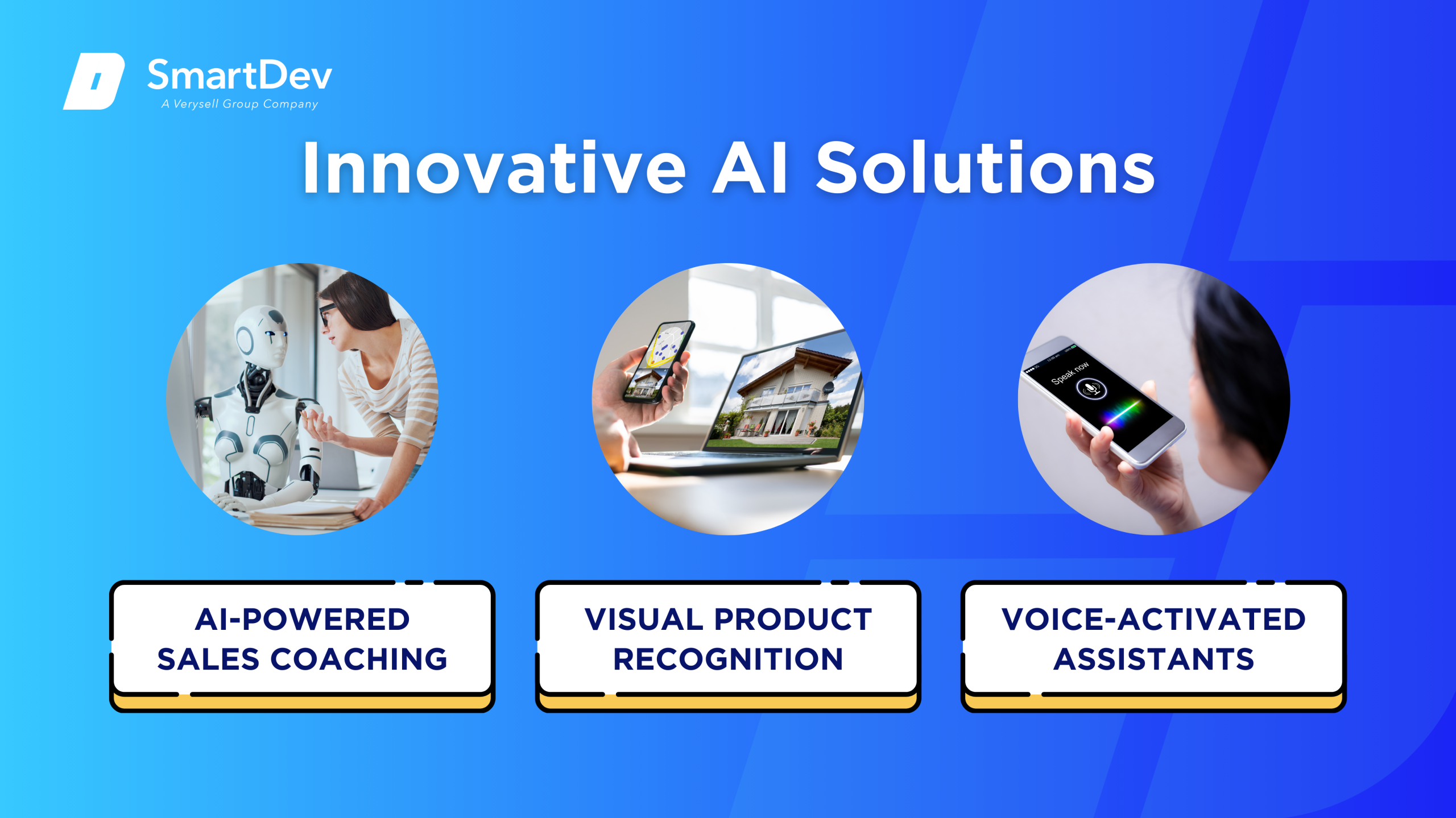
Emerging AI technologies are redefining sales by improving productivity and enhancing personalization. Key innovations include AI-powered sales coaching, visual product recognition, and voice-activated assistants.
AI sales coaching tools analyze calls to provide real-time feedback, helping reps refine their delivery and boost close rates. This reduces the need for manual oversight while driving consistent performance improvements.
Visual recognition allows customers to search products by image, simplifying discovery and speeding up conversions. Voice assistants automate tasks like scheduling and CRM updates, freeing sales teams to focus on high-value interactions.
AI-Driven Innovations Transforming Sales
Emerging Technologies in AI for Sales
Artificial Intelligence (AI) is revolutionizing the sales landscape, introducing tools that enhance efficiency and effectiveness across the sales funnel. Generative AI, for instance, is being utilized to craft personalized email content, develop compelling sales presentations, and even simulate negotiation scenarios, enabling sales teams to engage prospects more effectively.
Computer vision, another facet of AI, is aiding in visual data analysis, allowing sales teams to better understand customer behavior through video interactions and facial expression analysis. This technology provides insights into customer engagement levels, helping sales representatives tailor their approaches accordingly.
Die Rolle der KI bei Nachhaltigkeitsbemühungen
AI contributes to sustainability in sales by optimizing resource allocation and reducing waste. Predictive analytics can forecast demand more accurately, ensuring that inventory levels are aligned with customer needs, thereby minimizing overproduction and excess stock.
Smart systems powered by AI also optimize energy consumption within sales operations. For example, AI can manage lighting and climate control in retail environments based on customer traffic patterns, leading to significant energy savings.
How to Implement AI in Sales
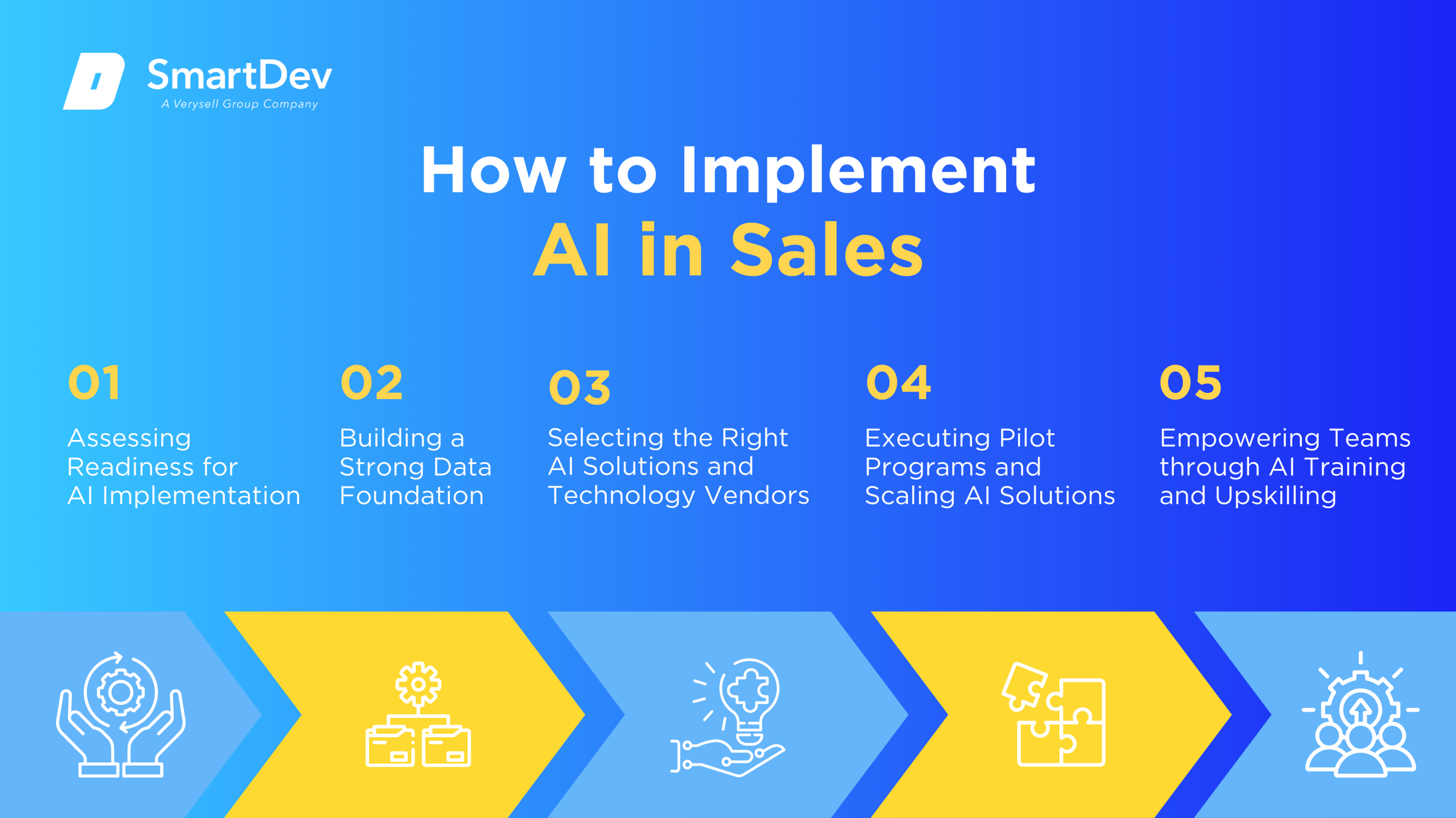
Schritt 1. Beurteilung der Bereitschaft zur KI-Einführung
Before integrating AI into your sales processes, it’s crucial to assess your organization’s readiness. Identify areas within your sales operations where AI can have the most impact, such as lead generation, customer engagement, or sales forecasting. Evaluate your current technological infrastructure to ensure it can support AI tools and platforms.
Engage stakeholders across departments to understand their needs and concerns regarding AI adoption. This collaborative approach ensures that the AI implementation aligns with organizational goals and addresses potential resistance to change.
Schritt 2. Aufbau einer soliden Datengrundlage
AI’s effectiveness is heavily reliant on the quality of data it processes. Establish robust data collection methods to gather relevant customer and sales information. Ensure that data is cleaned and organized to prevent inaccuracies that could skew AI insights.
Implement data management best practices, including regular audits and updates, to maintain data integrity. This solid data foundation enables AI tools to deliver accurate predictions and recommendations, enhancing decision-making in sales strategies.
Schritt 3. Auswahl der richtigen Tools und Anbieter
Selecting appropriate AI tools and vendors is critical to the success of your AI initiatives. Evaluate AI platforms based on their compatibility with your existing systems, scalability, and the specific sales challenges they address.
Consider vendors with a proven track record in your industry and those that offer comprehensive support and training. This ensures a smoother integration process and maximizes the return on your AI investment.
Schritt 4. Pilottests und Skalierung
Begin with pilot projects to test AI applications in a controlled environment. This approach allows you to measure performance, gather feedback, and make necessary adjustments before a full-scale rollout.
Once the pilot demonstrates success, develop a roadmap for scaling up AI implementation across your sales operations. Monitor progress and continuously refine AI strategies to adapt to evolving business needs and market conditions.
Schritt 5. Schulungsteams für eine erfolgreiche Implementierung
Empower your sales teams with the skills and knowledge required to work alongside AI technologies. Provide comprehensive training programs that cover the functionalities of AI tools and how they enhance sales processes.
Encourage a culture of continuous learning and innovation, where employees are motivated to embrace AI as a valuable asset rather than a replacement. This mindset fosters collaboration between human expertise and AI capabilities, leading to improved sales outcomes.
Measuring the ROI of AI in Sales
Wichtige Kennzahlen zur Erfolgsmessung
To evaluate the return on investment (ROI) of AI in sales, monitor metrics such as productivity improvements, cost savings achieved through automation, and revenue growth. Track the time saved on administrative tasks, the increase in qualified leads, and the conversion rates to assess AI’s impact on sales efficiency.
Analyze customer engagement levels and satisfaction scores to determine how AI-driven personalization influences buyer behavior. These insights help in fine-tuning AI applications to better meet customer needs and drive sales performance.
To better understand how to evaluate the value of AI in your business, explore our guide on unlocking AI return on investment.
Fallstudien zum ROI
A notable example is Salesforce’s integration of AI tools like Agentforce AI and Sales Coach, which enhanced client interactions by providing real-time advice and simulating negotiation techniques. This led to improved preparedness in face-to-face meetings and increased sales effectiveness.
Another case is Oracle’s deployment of AI agents to assist sales professionals with customer interactions and administrative tasks. These agents managed tasks such as updating company records and generating reports, reducing the workload of salespeople and allowing them to focus on strategic activities.
Häufige Fehler und wie man sie vermeidet
One common pitfall in AI implementation is underestimating the importance of data quality. Poor data can lead to inaccurate predictions and recommendations, undermining the effectiveness of AI tools. To avoid this, invest in robust data management practices and ensure continuous data validation.
Another challenge is resistance to change among sales teams. Address this by involving employees in the AI adoption process, providing adequate training, and demonstrating the tangible benefits of AI in their daily tasks. This approach fosters acceptance and encourages proactive engagement with AI technologies.
Future Trends of AI in Sales
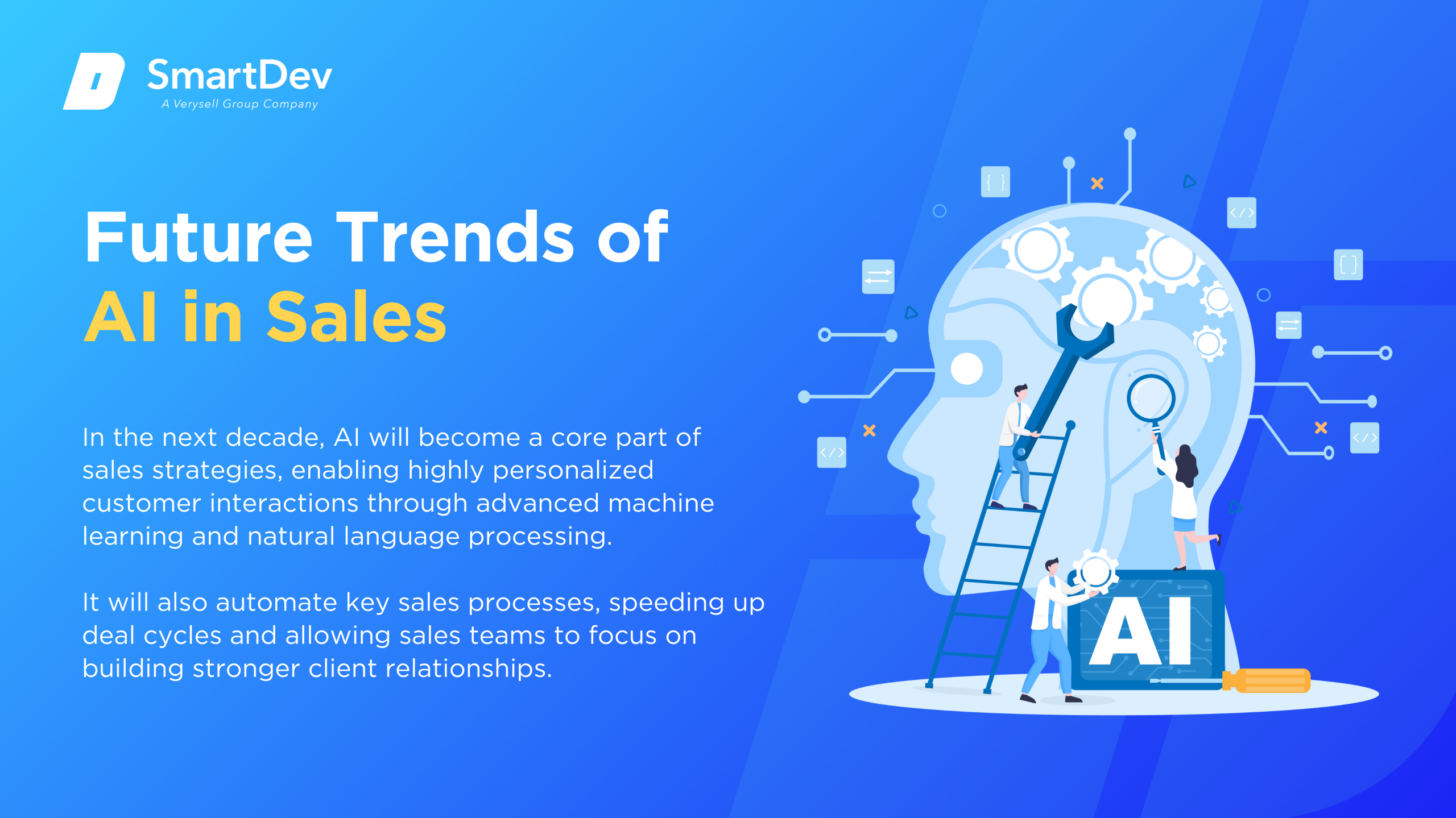
Prognosen für das nächste Jahrzehnt
Over the next decade, AI will shift from being a helpful tool to a central pillar in modern sales strategies. Sophisticated advancements in machine learning and natural language processing will enable systems to decode customer behaviors with pinpoint accuracy, leading to hyper-personalized interactions. These developments will drive smarter targeting and increase the precision of sales engagement across every channel.
AI will also transform the sales process itself, automating everything from lead qualification to closing deals with unprecedented efficiency. This intelligent automation will not only accelerate deal cycles but also reduce operational friction across teams. As a result, sales professionals can concentrate on higher-value activities like building meaningful client relationships and crafting long-term strategies.
Wie Unternehmen immer einen Schritt voraus sein können
To maintain a competitive edge, forward-thinking companies must proactively track AI innovations and reassess their sales models regularly. Prioritizing investments in AI research and cultivating strategic alliances with leading technology partners will unlock early access to game-changing tools and insights. This proactive stance ensures companies remain agile and ahead of shifting market dynamics.
Equally important is fostering a workplace culture that embraces innovation and change. By encouraging continuous learning and empowering teams to experiment with AI technologies, businesses can seamlessly integrate new capabilities into their sales workflows. This adaptability will be critical for future-proofing sales operations and sustaining long-term growth in an AI-driven marketplace.
Abschluss
Die wichtigsten Erkenntnisse
AI is transforming sales by enhancing efficiency, personalization, and decision-making. From automating routine tasks to providing deep customer insights, AI tools empower sales teams to focus on strategic activities that drive revenue growth. Successful AI implementation requires a solid data foundation, the right tools, and a culture that embraces innovation.
AI’s impact on sales is not just technological, it’s deeply human. By augmenting human intelligence with data-driven insights and automating repetitive tasks, AI allows your salesforce to do what they do best: build relationships and close deals. As the landscape becomes increasingly competitive, leveraging AI is quickly becoming a necessity for sustainable growth and market leadership.
Vorwärtskommen: Ein Weg zum Fortschritt
As AI continues to evolve, sales organizations have an unprecedented opportunity to accelerate growth, improve customer engagement, and outpace the competition. Embracing AI strategically means more than just adopting new tools, it requires building a data-driven culture, aligning technology with business goals, and empowering your sales team to make smarter, faster decisions. When implemented effectively, AI becomes a force multiplier that enhances performance at every stage of the sales funnel.
Bei SmartDev, we deliver custom AI solutions that redefine how sales teams operate and compete. From intelligent lead scoring and real-time customer insights to automation that eliminates administrative burden, our team helps you transform sales strategies and achieve measurable impact.
Kontaktieren Sie uns noch heute to explore how AI can unlock new revenue opportunities, elevate customer experiences, and future-proof your sales operations. Partner with SmartDev to lead the next generation of sales innovation.
—
Quellen:
- The state of AI: How organizations are rewiring to capture value | McKinsey & Company
- AI Adoption in 2024: 74% of Companies Struggle to Achieve and Scale Value | Boston Consulting Group
- AI for sales | IBM
- The Role of Artificial Intelligence in Sales | Gartner
- An unconstrained future: How generative AI could reshape B2B sales | McKinsey & Company
- How generative AI Is shaping the future of marketing | Journal of the Academy of Marketing Science
- How AI Is Transforming Sales Forecasting: A Deep Dive | Clari
- Understand How Einstein Scores Your Leads | Salesforce
- Salesforce sellers are using AI to improve their face-to-face client meetings and calls | Business Insider
- Oracle rolls out AI agents for sales professionals | Reuters
- How AI Agents Are Driving ROI: 3 Useful Case Studies from the Real World | Creole Studios







